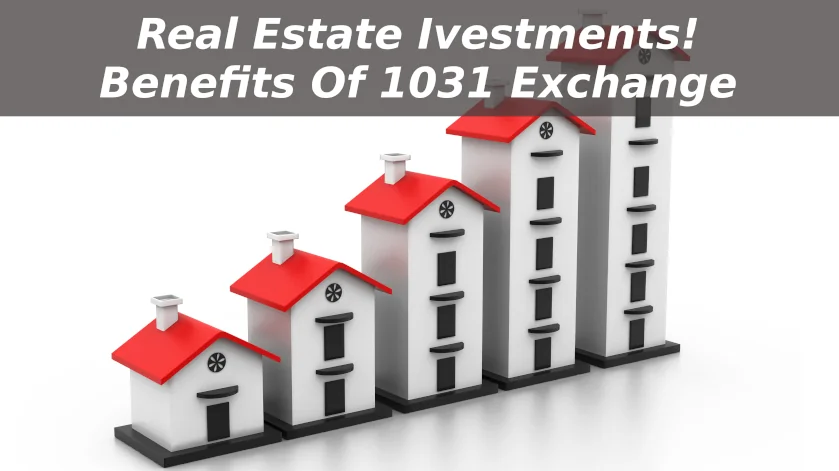
The Benefits and Strategies of a 1031 Exchange
1031 Exchange for Real Estate Investors
Investing in real estate can be rewarding, but it often involves substantial financial obligations and a fair amount of continuous effort. One of the significant challenges for real estate investors is the tax burden associated with property transactions. However, there’s a powerful tool at your disposal – the 1031 exchange.
Let’s delve into the concept of 1031 exchanges, their benefits, and strategies to maximize their advantages.
However, first a brief disclaimer. This article is for informational purposes only. It is not intended to be legal or accounting advice for the reader. In Addition, it is recommended that you seek legal and accounting advice from the licensed expert. Thus, the Owner, Broker and Agents with Kashmiri Realty & Property Management Inc. are not responsible for your investment decisions based on the content and context of this informational article. Enjoy!
Understanding the 1031 Exchange
What is a 1031 Exchange?
The 1031 exchange, as defined in section 1031 of the United States IRS Code, provides a unique opportunity for real estate investors to defer income-based tax liabilities imposed by both the Federal Government and local state tax laws. This exchange applies to specific property transactions, allowing investors to defer taxes by reinvesting in a property of equal value and purpose.
- A 1031 exchange, under section 1031 of the IRS Code, enables investors to defer income-based tax liabilities.
- This program applies to specific property transactions, allowing for tax deferral by reinvesting in a property of equal value and purpose.

Eligibility and Property Types
This program is available exclusively to owners of investment and commercial properties. For instance, if you own a commercial property that you lease to business owners, you can sell it and reinvest the profits into another property of equal or greater value with a similar purpose. However, it’s crucial to note that “equal purpose” refers to the type of property and its use by tenants. You can’t switch from a commercial property to a residential one; the goal is to incentivize property development.
- 1031 exchanges are exclusive to owners of investment and commercial properties.
- “Equal purpose” refers to matching property types and tenant usage.
- Transitioning from commercial to residential properties doesn’t qualify under this program.
Related Information: Visit our Information Hub for more on Real Estate Opportunities, Tips, and Pitfalls.
Benefits of 1031 Exchanges
Economic and Community Impact
Beyond individual benefits, 1031 exchanges have a broader positive impact on the economy and communities. Consequently, by promoting property development and rehabilitation, this program stimulates job creation and local growth. It prevents vacant properties from becoming neighborhood eyesores. Thus, contributing to increased property values as these properties are improved, rented, or sold.
- 1031 exchanges stimulate property development and rehabilitation, promoting job creation.
- They contribute to local growth by preventing vacant properties from becoming neighborhood eyesores.
- Improved properties lead to increased property values, benefiting communities.
Exclusions
It’s essential to understand the limitations of 1031 exchanges. Stocks, bonds, and personal or business property do not qualify under the IRS 1031 Code. Moreover, properties overseas are explicitly excluded, emphasizing that the real estate must fall within the 50 states of the United States, with some exceptions for properties in the Virgin Islands.
- Stocks, bonds, and personal/business property do not qualify for 1031 exchanges.
- Overseas properties are not eligible; the real estate must be within the 50 states (with exceptions for the Virgin Islands).
Leveraging 1031 Exchanges for Small Business Owners
Small Business Advantages
Small business owners entering the real estate market can leverage 1031 exchanges in innovative ways. Moreover, pairing this program with government housing programs, like the Department of Housing and Urban Development (HUD), designed for distressed property improvements, can enhance gains and position you for more substantial investments.
- Small business owners can creatively use 1031 exchanges, especially when paired with government housing programs like HUD.
- Leveraging these programs can enhance gains and enable investments in larger projects.
Overcoming Challenges and Timing
Finding the Right Property
One common concern is finding a suitable replacement property that meets the “like-kind” requirement. Hence, there’s a provision for a 90-day window after closing the sale of your property to locate and acquire a suitable replacement. However, this time can pass quickly due to the numerous tasks involved, such as paperwork, legal matters, appraisals, inspections, and consultations with CPAs.
- After selling your property, there’s a 90-day window to locate and acquire a suitable replacement.
- Timely planning is crucial due to the various tasks involved, including paperwork, legal matters, appraisals, inspections, and consultations with CPAs.
A 1031 exchange can be a game-changer for real estate investors. By deferring taxes and encouraging property development, it not only benefits individuals but also strengthens local communities. As a small business owner, you can strategically utilize this program to expand your real estate portfolio. While challenges exist, with proper planning and expertise, you can maximize the advantages of a 1031 exchange and take your real estate investments to the next level.


Pingback: How To Avoid Getting Your Home Loan Application Denied – Kashmiri Realty & Property Management